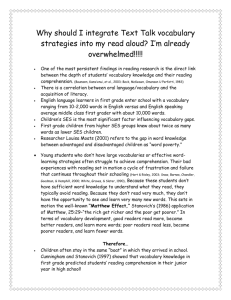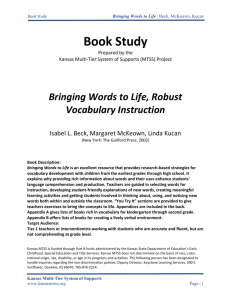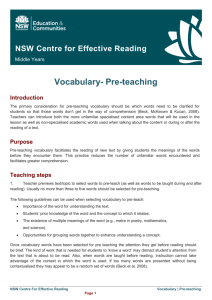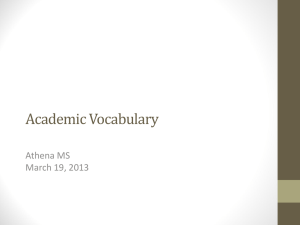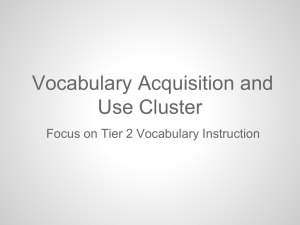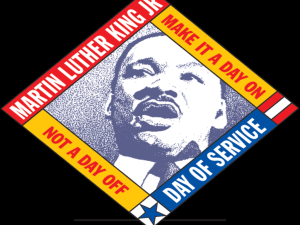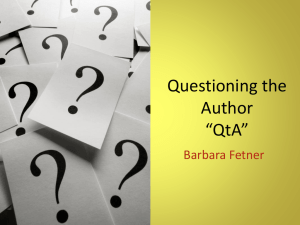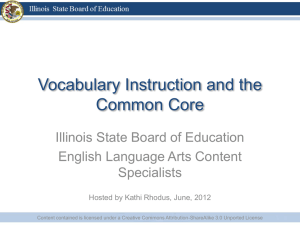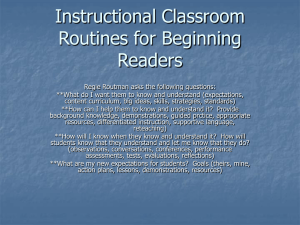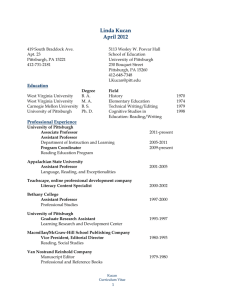Vocabulary Activities
advertisement
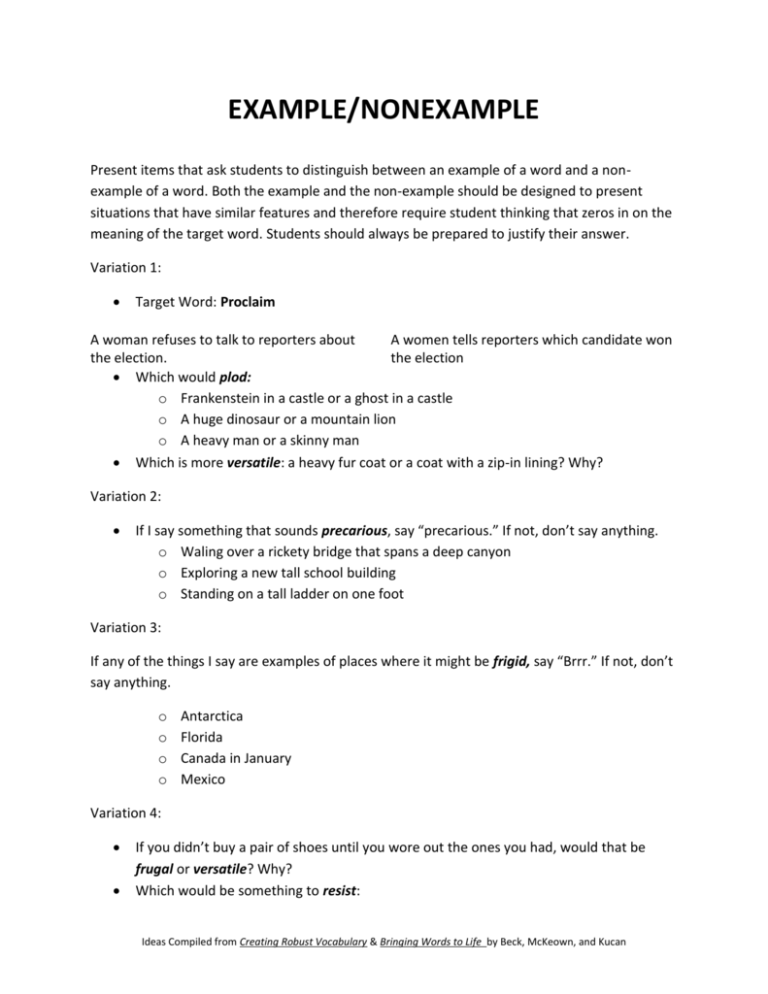
EXAMPLE/NONEXAMPLE Present items that ask students to distinguish between an example of a word and a nonexample of a word. Both the example and the non-example should be designed to present situations that have similar features and therefore require student thinking that zeros in on the meaning of the target word. Students should always be prepared to justify their answer. Variation 1: Target Word: Proclaim A woman refuses to talk to reporters about A women tells reporters which candidate won the election. the election Which would plod: o Frankenstein in a castle or a ghost in a castle o A huge dinosaur or a mountain lion o A heavy man or a skinny man Which is more versatile: a heavy fur coat or a coat with a zip-in lining? Why? Variation 2: If I say something that sounds precarious, say “precarious.” If not, don’t say anything. o Waling over a rickety bridge that spans a deep canyon o Exploring a new tall school building o Standing on a tall ladder on one foot Variation 3: If any of the things I say are examples of places where it might be frigid, say “Brrr.” If not, don’t say anything. o o o o Antarctica Florida Canada in January Mexico Variation 4: If you didn’t buy a pair of shoes until you wore out the ones you had, would that be frugal or versatile? Why? Which would be something to resist: Ideas Compiled from Creating Robust Vocabulary & Bringing Words to Life by Beck, McKeown, and Kucan o Laughing at someone’s joke or laughing at someone’s mistake? Why? Variation 5: If you had a very special photograph of a friend who had moved away, would you refer to it as a memento or a talisman? Why? If you had a special keychain, a kind of lucky charm, would you refer to it as a memento or a talisman? Why? Ideas Compiled from Creating Robust Vocabulary & Bringing Words to Life by Beck, McKeown, and Kucan WORD ASSOCIATIONS Variation 1: Target Words: accomplice, virtuoso, philanthropist, and novice o Which word goes with crook? o Which word goes with “gift to build a new hospital”? o Which word goes with piano? o Which word goes with kindergartner? Target words: tedious, extravagant, and pretentious o I spent all my allowance for 6 months on the video. o I can’t face another minute of this! o You’re so lucky that I am part of your team. Variation 2: Students complete the chart. This, as is the case for most of Beck’s examples, should be a teacher led activity. Word Eloquent Associations President Kennedy Pervasive Computer viruses Fidelity Having the same best friend all your life Reasons/explanations Kennedy was an excellent speaker. People still talk about his speeches. Viruses seem to be all over the place and you always have to be on the watch for them. You are always faithful to that person. Variation 3: Idea Substitution – students hear a sentence that has something to do with one of their words, and then indicate which word. They then revise the sentence in a way that includes the word. I didn’t want to answer his questions so I pretended I didn’t hear him. Which new word goes with that sentence? (evade) Student: I didn’t want to answer his questions so I evaded him. Ideas Compiled from Creating Robust Vocabulary & Bringing Words to Life by Beck, McKeown, and Kucan GENERATING SITUATIONS, CONTEXTS, AND EXAMPLES In this set of activities students are not provided with choices. Rather, students are asked to generate appropriate contexts or situations for statements or questions about their words. Variation 1: In this example, the situation remains constant but students are asked to apply different target words. What would make a teacher say this to her class? o What an industrious class you are! o What a clever class you are! o What a splendid class you are! o What a versatile class you are! o What would an immense plate of spaghetti look like? Why might you feel miserable after eating all the spaghetti? What would it look like to eat spaghetti in a leisurely way? Variation 2: The questions below require developing situations across various contexts. Why might you go on a crusade? Where might you go to see artifacts? Why is wearing clothes from a thrift store a frugal thing to do? Why might you examine and apple you found on the street? Variation 3: Here students need to develop comments that people might make that are associated with target words. What might an audience say about a splendid musician? What might a generous person say to a miser? What might someone who is exuberant say about your new bike? What might someone who is frugal say when looking at the price tag on a coat? Variation 4: This could be done in a collaborative group. For example, each group could respond to the different positions of the following: How might a ….cook….a musician….a basketball player….a teacher show they are: Ideas Compiled from Creating Robust Vocabulary & Bringing Words to Life by Beck, McKeown, and Kucan o o o o Versatile Industrious Clever Expert Variation 5: Students develop descriptions of the target words in various situations: Three things that would be altruistic Three people that might be gregarious Three things a misanthrope might do Ideas Compiled from Creating Robust Vocabulary & Bringing Words to Life by Beck, McKeown, and Kucan WORD RELATIONSHIPS Having students think about and respond to how two words might be related helps students develop rich word knowledge. There are many activities/situations to encourage students to interact with novel concepts for the words. Here are just a few suggestions. Variation 1: Ask students to describe how two vocabulary words might be connected or related. Compassionate/advocate—A compassionate lawyer might act as an advocate for someone who is in need and otherwise could not afford a lawyer. Variation 2: Phrase a question around two words and ask students to respond and then explain their answers. What might a meticulous person be vulnerable to? Variation 3: Analogies can be developed leaving one part blank. Eventually, students can construct their own. Nonchalant/sarcastic—If you are acting nonchalantly, you are trying hard not to be noticed; if you are being sarcastic, you are trying hard not to be … Variation 4: Word sort—this is effective once a number of words have been introduced. Create any categories. Capitalism Competition Profit Free enterprise Socialism Regulation collectivism Variation 4: Continuums—students place phrases/words on a word line that represents a continuum and explain their placement. How surprised would you be if … 1. You saw your friend vault over the moon? 2. Your teacher commended you for doing good work? 3. A dog started bantering with you? 4. The mayor urged everyone to leave town? Ideas Compiled from Creating Robust Vocabulary & Bringing Words to Life by Beck, McKeown, and Kucan 5. A coach berated his football team for not making a touchdown? 6. A rabbit trudged through a garden? Least surprised Most surprised Variation 5: Applause/Applause—students are asked to respond to indicate how much they would like: Having your room described as eerie Having a stern teacher Being described as a diligent student Ideas Compiled from Creating Robust Vocabulary & Bringing Words to Life by Beck, McKeown, and Kucan WRITING Variation 1: Provide students with sentence stems. The key is to include the because which requires the students to explain “why?” The student opened her math test with a perplexed expression because … My father’s library is prodigious because… Variation 2: Students can be asked to extend their writing as well. Think of someone you could describe as one of the following: precocious, meticulous, or tenacious. Tell what that person is like. Variation 3: Prompt students to use several of their vocabulary words in a writing assignment. You can leave it open ended or provide the premise for them. Some premises are: Finding a puppy with a bag of money tied around its neck at your door. Arriving at a new city and people think you are a celebrity. RETURNING TO THE STORY CONTEXT Having students return to the original context in which they met the vocabulary word is a powerful way to reinforce the connection understanding vocabulary and understanding story ideas. The following question comes from The Watsons Go to Birmingham—1963 (Curtis, 1995). In his epilogue, Christopher Paul Curtis wrote: “In the Northern, Eastern, and Western states, African Americans often faced discrimination, but it was not as extreme and pervasive as in the South” (207). What did he mean? o Find examples of discrimination mentioned in the novel. PUZZLES Students always seem to enjoy puzzles that lead them through clues to an answer. When students are comfortable with this format they can create the series of clues. Target word: relinquish o It is hard for dogs to do this with a delicious bone. o This word means to “give something up.” o This word has nine letters and starts with an r________________ Ideas Compiled from Creating Robust Vocabulary & Bringing Words to Life by Beck, McKeown, and Kucan
